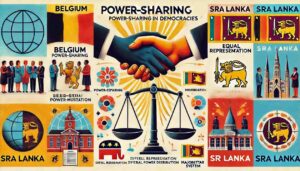
Power Sharing : Class 10 Civics
Welcome to Triple W, your one-stop platform for quality educational content. In this post, we delve into the important concepts of Class 10 Civics, Chapter 1: Power Sharing. Power-sharing is a vital aspect of any democracy, ensuring a balance of power among various groups and organs of government. In this chapter, we explore how different countries like Belgium and Sri Lanka have approached power-sharing, the consequences of these systems, and why power-sharing is essential in modern democracies. Let’s break down key questions and their answers to help you better understand the topic.
1. Why is power sharing desirable?
Answer: Power sharing is desirable for two main reasons:
- Prudential reasons: Power sharing helps reduce the possibility of conflict between different social groups. It ensures the stability of political order, as power is not concentrated in the hands of a single group or individual.
- Moral reasons: Power sharing is valuable because it upholds the spirit of democracy. People have a right to be consulted on how they are governed, and every individual and group should have a say in political decisions.
2. What are the different forms of power-sharing in modern democracies?
Answer: Modern democracies have adopted various forms of power-sharing:
- Horizontal distribution of power: Power is shared among different organs of government, such as the legislature, executive, and judiciary. This ensures a system of checks and balances.
- Vertical distribution of power: Power is shared among different levels of government—central, state, and local governments.
- Community government: Power is shared among different social groups, like religious or linguistic groups. For example, Belgium has a community government to accommodate various ethnic groups.
- Power-sharing through political parties, pressure groups, and movements: In a democracy, power is also shared among different political parties and interest groups.
3. What is the significance of the Belgium model of power sharing?
Answer: The Belgium model of power-sharing is significant because it successfully resolved the tension between the Dutch-speaking and French-speaking communities. The key features of this model are:
- Equal representation in government: Both communities are given equal representation in the central government.
- Separate government for Brussels: Brussels, the capital city, has a government with equal representation for both communities, ensuring neither group dominates.
- Community government: Belgium has a community government that manages cultural, educational, and language-related issues, thus accommodating various ethnic groups.
4. Describe the power-sharing arrangement in Sri Lanka.
Answer: Sri Lanka followed a majoritarian model of governance, which gave preference to the Sinhalese community (74% of the population) over the Tamil-speaking minority (18%). In 1956, an Act was passed that declared Sinhala as the only official language, disregarding Tamil. The government also fostered policies that favored the Sinhalese in government jobs and education. This led to discontent among the Tamils, resulting in demands for equal rights and later, the demand for an independent Tamil Eelam.
5. What were the consequences of the majoritarian policies in Sri Lanka?
Answer: The majoritarian policies in Sri Lanka led to:
- Tensions and conflicts: The Tamil-speaking minority felt alienated due to the dominance of the Sinhalese community in language, jobs, and culture.
- Civil war: The political exclusion of Tamils resulted in a civil war between the Sinhalese-controlled government and Tamil insurgents, leading to widespread violence, loss of life, and displacement of people.
- Demand for an independent Tamil state: The Tamil community demanded autonomy and an independent state, which worsened ethnic relations in the country.
6. What is the difference between prudential and moral reasons for power-sharing?
Answer:
- Prudential reasons refer to the practical aspects of power-sharing that are aimed at promoting stability and reducing conflict in society. It is done to ensure the political and social harmony necessary for a stable government.
- Moral reasons focus on the idea of fairness and democracy. Power-sharing is seen as the right thing to do in a democracy, as it gives all groups, especially minorities, the opportunity to participate in the governance process.
7. How is power shared in Belgium and Sri Lanka?
Answer:
- Belgium: Power is shared among different communities through equal representation in the central government, the existence of a separate government for Brussels, and community governments for managing cultural and linguistic issues.
- Sri Lanka: Power is concentrated with the majority Sinhala community, leading to the exclusion of the Tamil minority. This majoritarian system caused ethnic tensions and demands for Tamil autonomy.
Disclaimer:
The content provided on Triple W is intended for educational purposes only. While every effort has been made to ensure the accuracy of the information, we advise students to cross-reference with their textbooks and consult teachers for further clarification. Triple W does not take responsibility for any discrepancies or variations in interpretations.